
Alianza Net-Zero MAR
The European Union has set the ambitious targets of reducing net emissions by at least 55% by 2030 (compared to 1990) and becoming the first climate-neutral continent by 2050. The objectives outlined in the European Green Deal strategy are already obligations set out in the European Climate Law, adopted in July 2021, and defined in detail in the Fit for 55 regulatory basket of measures. In this context, the challenge in terms of decarbonisation and environmental protection for the maritime-port sector is considerable and will undoubtedly require substantial investments in multiple innovative technologies.
The Alianza Net-Zero MAR aims to:
- Contribute to the decarbonisation of the maritime-port sector in Spain
- Promote emission reductions in ports and maritime transport
- Promote the coordinated action of public and private actors in the port, maritime and energy sectors
- Contribute to positioning the Spanish maritime industry as a driving force in the electrification of ports and in the decarbonisation of maritime transport
- Be the reference platform for the sector in the field of decarbonisation
- Promote the generation of electricity from renewable sources in ports, as well as the production of alternative fuels
The Alliance
Activities of the Alianza Net-Zero Mar

Technical support to the members to accelerate the decarbonisation of Spanish maritime transport and ports.

Communication and training activities.

Working groups on specific topics of interest to the members, studies and publications.

Support the development of uniform criteria within the legislative framework, on safety issues, development of fiscal, financial or aid structures to accelerate the decarbonisation of maritime transport and ports.

Create an information exchange platform, the promotion of a favorable state of opinion, analysis of the legislative framework, a source of statistics and updated information on decarbonisation in the Spanish maritime-port sector.

Define a roadmap to achieve the decarbonisation of the sector from a technological, regulatory and economic point of view.

Technical support to the members to accelerate the decarbonisation of Spanish maritime transport and ports.

Communication and training activities.

Working groups on specific topics of interest to the members, studies and publications.

Support the development of uniform criteria within the legislative framework, on safety issues, development of fiscal, financial or aid structures to accelerate the decarbonisation of maritime transport and ports.

Create an information exchange platform, the promotion of a favorable state of opinion, analysis of the legislative framework, a source of statistics and updated information on decarbonisation in the Spanish maritime-port sector.

Define a roadmap to achieve the decarbonisation of the sector from a technological, regulatory and economic point of view.
Members of the Council
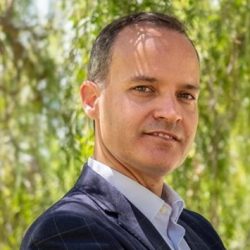
Javier Cervera
Graduated as a telecommunications engineer from the Polytechnic University of Valencia, and formed in business management by EDEM and business development by ESIC, he began his professional career in the world of entrepreneurship by developing a telemedicine company in 2002. In 2005 he joined the energy sector with Unión Fenosa, where he worked for 14 years in commercial tasks managing the Levante delegation, and in business development of the alternative fuel bunkering business for Europe in what is now Naturgy. In 2019, he moved from the energy sector to the maritime sector, where he joined the shipping company Baleària, leading the company’s decarbonisation actions, both in the development of the company’s LNG strategy and in the introduction of new biofuels. Since 2014 he has been a member of the board of directors of the Association of Energy Engineers, and is currently the President of the Association in Spain.
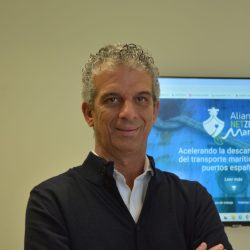
Santiago Yanes
He holds a degree in Technical Architecture from the University of La Laguna, a degree in Industrial Technical Engineering from the University of Las Palmas de Gran Canaria, and a degree in Mechanical Engineering from the Catholic University of Ávila. He is an expert in Photovoltaic Energy from UNED. In 1997, he joined the Port Authority of Santa Cruz de Tenerife, where he held the position of Head of Maintenance for 10 years. He then became the head of the Industrial Installations Unit and, for the last 4 years, the Head of the Innovation and Strategic Projects Division. Since 2022, he has been the Deputy Director of the Blue Economy Chair at the University of La Laguna-Tenerife Ports.

Eva Pérez
She holds a degree in Business Administration and Management from the University of Granada and a Master of Science in Business Research from the Birmingham Business School, University of Birmingham. Between 2000 and 2004 she worked as project manager at the Institute of International Economics of the University of Valencia. In April 2004 she joined Fundación Valenciaport, where she started working as project manager and held various positions until her current position as Director of Innovation Promotion. She has 20 years of experience in the management and development of R&D&I projects in the areas of environmental sustainability of ports and maritime transport, zero emission port planning, alternative fuels for the maritime-port sector, short-sea shipping and studies of financial viability and cost-benefit analysis of port infrastructure projects and maritime transport services. She teaches Master’s programmes in several Spanish universities and in Latin America in the fields of maritime economics and environmental sustainability of the maritime-port sector.

Marta García Pellicer
Dr. Marta García Pellicer, General Director of ITE (since April 2016), holds a PhD in Industrial Engineering from the Polytechnic University of Valencia and an MBA in Business Administration and Management. Her professional career, spanning over 30 years, has always been linked to the field of research and innovation, specifically at the Institute of Energy Technology (ITE). Before becoming the director of the institute, she served as deputy director since 2001. She has extensive research experience in the energy sector, covering topics such as energy storage, smart grids, demand management and distributed generation, supply quality, and electromobility. She has been the principal investigator in more than 40 projects and is an evaluator for ANEP. She is a co-inventor of 7 patents that encompass key innovations in energy and resource management. She represents both ITE and the Valencian Community in various forums. Notably, she represents the Valencian Community on the European S3P platform in Smartgrids, is a member of the Valencian Innovation Council, the strategic reflection groups of the Valencian Innovation Agency, the governing group of the Futured Networks Platform, and a member of the NetZeroMar Alliance. Additionally, she actively participates in defining the Biogas table of the Valencian Community, working alongside the Regional Administration to define objectives, identify challenges, and determine the members who should be part of it. Since 2021, she has held the position of second vice president on the board of directors of REDIT, the Network of Technological Institutes of the Valencian Community.

Bernat Ibáñez
Industrial Engineer from the Polytechnic University of Valencia, specializing in Construction and Industrial Installations. He holds an Executive MBA from EDEM, an Official Master’s in Renewable Energies from CEU-San Pablo University, a Master’s in Occupational Risk Prevention from UJI of Castellón, and is currently pursuing a Master’s in Port Management and Intermodality from Puertos del Estado. With over 18 years of experience, he has held various positions related to engineering and project management, including his work as an R&D Project Technician at Becsa and as Head of Innovation and New Technologies at Simetría Grupo. He is currently the Head of the Innovation Division at the Port Authority of Castellón, where he leads the development and implementation of innovative activities, promotes an organizational culture of innovation, and coordinates strategic decarbonization and energy efficiency projects, with active participation in international consortia and management of funds and grants.
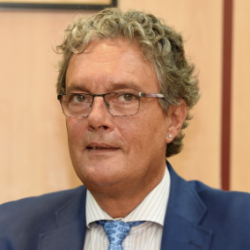
Guillermo Amann
Industrial Engineer and Doctor in Electrical Power Systems.
He has spent practically his entire professional career at Ormazabal, a company belonging to the Spanish family-owned industrial group Velatia. He currently holds the position of Deputy to the CEO, being responsible for institutional and sectorial relations and collaborating in the strategic development of the business.
He is Chairman of AFBEL (Asociación Nacional de Fabricantes de Bienes de Equipo Eléctrico) and Vice-Chairman of its European counterpart T&D EUROPE. He is also Vice-Chairman of AEDIVE (Spanish Association for the Development and Promotion of Electric Mobility).
He currently acts as spokesperson for the Spanish Forum for Electrification and is a member of the High Level Clean Energy Industrial Forum, a consultative body of the European Commission.
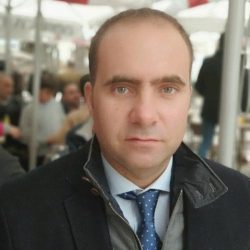
Adolfo Rozadillas
MEMBER OF THE COUNCIL
Civil Engineer with over 20 years of experience in key sectors such as ports and renewable energy. Expert in the management and coordination of highly complex projects, particularly in wind and solar photovoltaic energy, with involvement in the technical design and supervision of large-scale parks in Europe and Latin America. Extensive experience in civil infrastructure, leading high-speed and urbanization projects in Spain, and in renewable energy, managing substations and transmission lines. He has a solid educational background complemented by specialized master’s degrees in wind and renewable energy, focusing on ensuring the technical and economic viability of projects.
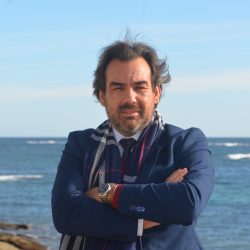
Marcelino Pernas Barcia
Expert in International Trade in Engineering (EPC) projects with over 20 years of experience leading strategic projects in the energy, industrial, and Oil & Gas sectors. My career focuses on the development of key initiatives both nationally and internationally in companies such as Hatch Engineering, contributing to strengthening foreign trade and collaboration between strategic markets.
Currently, I am the commercial director at Amper Sistemas (Grupo Amper) for the Energy and Oil & Gas sectors in Iberia and Mexico, where I lead projects such as Energy Control Centers for key clients like Engie, Iberdrola, Cepsa, among others, as well as promoting initiatives in port decarbonization and industrial automation for Navantia’s block factory.
My international experience includes roles as Country Manager in Mexico and Central America, managing notable projects in maritime terminals such as Vopak Mexico, in collaboration with Duro Felguera, as well as work in Mauritania, Zambia, Botswana, and South Africa, strengthening the expansion of technological solutions in emerging markets.
As a member of the Board of Directors of the Cantabria Chamber of Commerce, I contribute with a strategic vision focused on sustainability, technological innovation, and energy transition, supporting the development of advanced solutions for current and future challenges in key sectors.
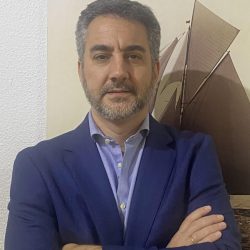
Ignacio Gómez Vera
MEMBER OF THE COUNCIL
Ignacio Gómez Vera is a Naval Engineer from the Polytechnic University of Madrid, with additional training in Strategic Innovation from ESADE Executive Education and Maritime Gas Transport (LNG) from the Spanish Maritime Institute (IME). With over 20 years of experience, he has specialized in innovation management and strategic coordination in sectors such as naval-maritime, among others. Currently, as Director of R&D and Strategic Projects at SYM Naval and a member of its Management Committee, he leads the strategic development of the R&D department, promoting innovative initiatives and projects aimed at decarbonization and emission reduction in ships. He also develops strategic projects for the shipyard and coordinates investment projects to strengthen its capabilities and technological positioning.
In his previous career, he specialized in consulting at FINESE, managing technical projects and designing innovation strategies for companies in sectors such as naval-maritime, among others. Additionally, in collaboration with the Public Administration, he coordinated aid programs for the naval sector during his time at the Innovamar Foundation and participated in European initiatives such as “Vessel for the Future” and “LeaderSHIP 2020”. He also contributed to FECYT in managing public R&D&I policies, fostering synergies between national and European administrations.
Secretariat Team
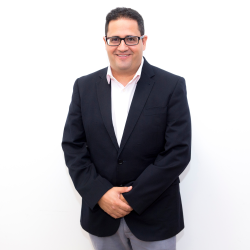
Jorge Lara

Ignacio Benítez

Pilar Sánchez






